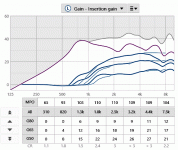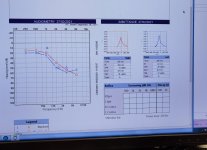Also- take care of yourself in a broad sense. Your ears are part of your body, and will last longer and perform better if you're healthy. Easy to say right? Give up processed food and excessive booze is a very solid start.
I understand that NSAIDs and acetaminophen can be a cause of hearing loss as well; probably a factor in my hearing loss due to arthritis meds.
They are also terrible for your gut lining. A study was done on gut permeability with indomethacin, dosced with and without accompanying bovine colostrum supplementation. The colostrum prevented otherwise massive damage. Bovine colostrum is a health food supplement which prevents NSAID induced gut damage | Gut Rat model but seems compelling.
After a long time, I attended a singer- songwriter concert two years ago. It was all PA driven sound, evey instrument was amplified over one PA equipment system. Location was an old cinema it seems, in Berlin. When I entered the main room, after two minutes I decided to put my ear wax into use. It was destructively loud. Most people seem to don't care about that, it seem to be a cool place for a concert and the audience enjoyed it.
I thought they must have been steeled ears to be able to enjoy such a high pressure, but totally bad sound, because this was modern PA equipment. And the sound engineer was the generation the louder the better. At the bar, the working persons seem not to be disturbed by that high pressure level of sound. The real fans were located in front of the stage, it must had been louder there, of course. Even not shocked from this high energy sound. During the concert, I tried for two minutes without my ear wax, it was horrible loud. So tell me, what will happen to those guys hearing ability when they audition such concerts many times in a year, just thinking it's pure fun. Anyone can see what happens now, in every city, there are some specialists having large business stores with electronic hearing aids. They make lots of money with it, this isn't cheap gear they sell and because of high profits and many new customers, they have a good life.
For me, that was the last concert with electronic music, because only those very few minutes without ear wax were sufficient, that my hearing ability became destructed for some weeks. No joke. It took some weeks before I had the need to listen to audio equipment again. In the first days, I don't want to listen to any louder noises, trying to do rehab for my ear damage. Sometimes, this could help to ease those destructions.
My listening ability have regained and I don't think this was a permanent destruction. But it shows clearly, that many young and middle aged people don't care or think its cool to listen to destructive levels of music. I think they will be near deaf by the age of 50, needing all electronic hearing aids. The future clients of the big stores in the citys, just because they don't know or think the thrill of loud music is greater than the own health damage.
With my 55 years, I have lost some hearing above 10 Khz, think 12K is the actual end.
Otherwise my hearing is pretty good for the age and I attended not many concerts in my youth and always have been very very cautious at high noise levels of all kinds.
The problem with audio is, good quality is expensive. Most people therefore have a good audio system when being older, some after retirement. And I met some of them, who gave up on audio because of their hearing loss.
But age isn't the major part for hearing loss. Its the noise levels that damages the ear and if one have good genes, he wouldn't suffer from arterial blood circulatory disorder in the ear, another big factor that can lead to hearing losses.
My mother had an extremely good hearing until the end of her life, she never attended concerts with high pressure levels and never damaged her ears. She could hear noises that I wasn't able to audition. So its all up to the genes and what people do in life for a good hearing, the less noise the better.
Otherwise, its nearly irrelevant for music enjoyment to be able to audition 15 Khz. We all life in the midrange, thats what determines the sound quality most. And that could be auditioned with a good hearing even at the age of 80 years.
Just be carefull with your ears, the whole life from youth to death. They will give you back the ability to enjoy music until the end. And don't smoke, this will ruin your arterias and cause all kinds of diseases, too.
I thought they must have been steeled ears to be able to enjoy such a high pressure, but totally bad sound, because this was modern PA equipment. And the sound engineer was the generation the louder the better. At the bar, the working persons seem not to be disturbed by that high pressure level of sound. The real fans were located in front of the stage, it must had been louder there, of course. Even not shocked from this high energy sound. During the concert, I tried for two minutes without my ear wax, it was horrible loud. So tell me, what will happen to those guys hearing ability when they audition such concerts many times in a year, just thinking it's pure fun. Anyone can see what happens now, in every city, there are some specialists having large business stores with electronic hearing aids. They make lots of money with it, this isn't cheap gear they sell and because of high profits and many new customers, they have a good life.
For me, that was the last concert with electronic music, because only those very few minutes without ear wax were sufficient, that my hearing ability became destructed for some weeks. No joke. It took some weeks before I had the need to listen to audio equipment again. In the first days, I don't want to listen to any louder noises, trying to do rehab for my ear damage. Sometimes, this could help to ease those destructions.
My listening ability have regained and I don't think this was a permanent destruction. But it shows clearly, that many young and middle aged people don't care or think its cool to listen to destructive levels of music. I think they will be near deaf by the age of 50, needing all electronic hearing aids. The future clients of the big stores in the citys, just because they don't know or think the thrill of loud music is greater than the own health damage.
With my 55 years, I have lost some hearing above 10 Khz, think 12K is the actual end.
Otherwise my hearing is pretty good for the age and I attended not many concerts in my youth and always have been very very cautious at high noise levels of all kinds.
The problem with audio is, good quality is expensive. Most people therefore have a good audio system when being older, some after retirement. And I met some of them, who gave up on audio because of their hearing loss.
But age isn't the major part for hearing loss. Its the noise levels that damages the ear and if one have good genes, he wouldn't suffer from arterial blood circulatory disorder in the ear, another big factor that can lead to hearing losses.
My mother had an extremely good hearing until the end of her life, she never attended concerts with high pressure levels and never damaged her ears. She could hear noises that I wasn't able to audition. So its all up to the genes and what people do in life for a good hearing, the less noise the better.
Otherwise, its nearly irrelevant for music enjoyment to be able to audition 15 Khz. We all life in the midrange, thats what determines the sound quality most. And that could be auditioned with a good hearing even at the age of 80 years.
Just be carefull with your ears, the whole life from youth to death. They will give you back the ability to enjoy music until the end. And don't smoke, this will ruin your arterias and cause all kinds of diseases, too.
Last edited:
I always put cotton-wool in my ears before Rock concerts like Led Zeppelin with experience.
I know carrots and Cod-Liver oil is good for your eyes.
Is there something good for dilapidated hearing?
AFAIK, you kick off with 20,000 cilia in your ears. Each is tuned to some frequency.
At my stage, I expect only about 2,000 are still working. The Brain can only compensate so much with whatever it does to get it working. Fast Fourier Transform, I expect.
My profoundly deaf mother had a thing called a cochlear implant. A mere 24 nerve connections. Said voices sounded like Daleks. But better than nothing. And got on better with female pitch than male. She was unable to actually distinguish people from their voices, but could understand most of it.
I think us slightly deaf people need MTTM:
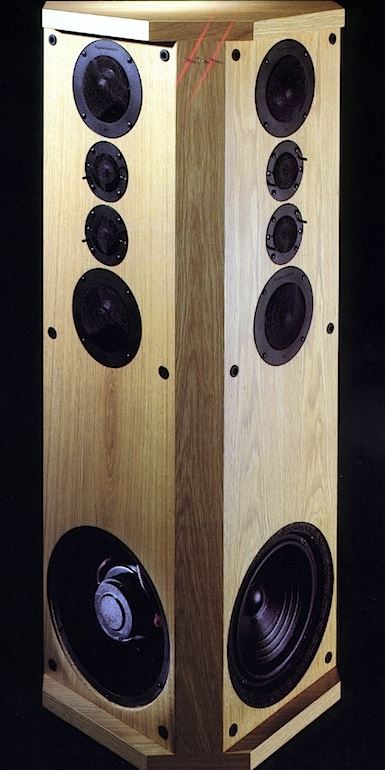
Problem with single drivers is they obey Inverse Square.
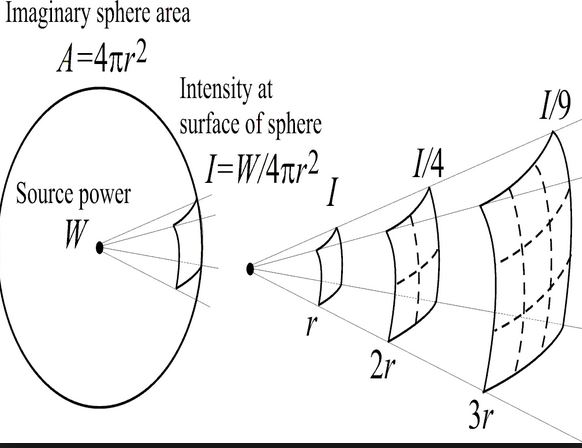
MTTM is much kinder. Being 1/R cylindrical dispersion or inverse distance. Recommended for overly lively echoey environments too:
ACOUSTIC SPECIAL SOLUTIONS
badman said:Also- take care of yourself in a broad sense. Your ears are part of your body, and will last longer and perform better if you're healthy. Easy to say right? Give up processed food and excessive booze is a very solid start.
I know carrots and Cod-Liver oil is good for your eyes.
Is there something good for dilapidated hearing?
AFAIK, you kick off with 20,000 cilia in your ears. Each is tuned to some frequency.
At my stage, I expect only about 2,000 are still working. The Brain can only compensate so much with whatever it does to get it working. Fast Fourier Transform, I expect.
My profoundly deaf mother had a thing called a cochlear implant. A mere 24 nerve connections. Said voices sounded like Daleks. But better than nothing. And got on better with female pitch than male. She was unable to actually distinguish people from their voices, but could understand most of it.
I think us slightly deaf people need MTTM:
Problem with single drivers is they obey Inverse Square.
MTTM is much kinder. Being 1/R cylindrical dispersion or inverse distance. Recommended for overly lively echoey environments too:
ACOUSTIC SPECIAL SOLUTIONS
Last edited:
Back in 1984 I read this book and by todays standards I wouldn't recommend it but it did touch on hearing loss. In the book the author talks about the drug hydrogene sp? This drug at .25 to .5mg s sometimes prescribed for early dementia. The author of this book thought it might cause some new neurons to grow in the brain and some of his followers used it off label at the huge doses in the 10mg range. Some people who did this noticed after a few months they reversed there high frequency hearing loss. But this drug is expensive even at .25mg so the cost of 10mg a day would most likely be several thousand dollars a month and being off label this would be out of pocket. https://www.amazon.com/Life-Extension-Practical-Scientific-Approach/dp/0446387355
I take a lot of NSAID's for my US Army damaged knees. No cartlege. I can still hear 14 khz, tested at work. I also eat a lot of processed food.I understand that NSAIDs and acetaminophen can be a cause of hearing loss as well; probably a factor in my hearing loss due to arthritis meds.
Been stable since 8/69, when I went to ROTC camp annoyed by the howl of televisions in the store, and came home unable to hear them. 15 khz, right? I've used EAR brand earplugs ever since.
Last edited:
I suppose this thread raises the issue of 'why bother with speakers which play to 20 KHz'.
I went to the odd loud concert in my youth - on the way home from a Queen gig in 1975 the muffler fell off my car and I didn't hear it - but have been very careful since. The occasional air show, but nothing in the past 10 years or so.
My hearing runs out at about 10,000 Hz, so I'm really not worried about off axis performance or whatever above that.
Geoff
I went to the odd loud concert in my youth - on the way home from a Queen gig in 1975 the muffler fell off my car and I didn't hear it - but have been very careful since. The occasional air show, but nothing in the past 10 years or so.
My hearing runs out at about 10,000 Hz, so I'm really not worried about off axis performance or whatever above that.
Geoff
Hi Art.
I've been wearing peltors at work for 25 years so I've avoided that pit fall.
Hopefully the youngin's heed the warning, cuz it's the truth.
I read a study once and there was high rates of recovery from tinnitus when a certain drug was used.
I can't remember the exact name but i think it was either nicotinic acid or niacinamid acid. I hope someone here has the time to look into it.
I've been wearing peltors at work for 25 years so I've avoided that pit fall.
Hopefully the youngin's heed the warning, cuz it's the truth.
I read a study once and there was high rates of recovery from tinnitus when a certain drug was used.
I can't remember the exact name but i think it was either nicotinic acid or niacinamid acid. I hope someone here has the time to look into it.
The 4KHz part explains the results of when I tested my father's hearing not so long ago (he is 55 or so), there was a dramatic dip in one ear at 4KHz, and he works a lot with power tools etc. and never uses any protections. Now I know why.
I don't look forward to the hearing loss that possibly comes with age, I am 31 and hear to about 17KHz... I did read about something around zebrafish and how playing with a gene let the hairs regrow. This could become the answer to the hearing loss down the line when there will be attempts at applying it to humans, I'll be first in line to test lol
I don't look forward to the hearing loss that possibly comes with age, I am 31 and hear to about 17KHz... I did read about something around zebrafish and how playing with a gene let the hairs regrow. This could become the answer to the hearing loss down the line when there will be attempts at applying it to humans, I'll be first in line to test lol
And the sound engineer was the generation the louder the better. At the bar, the working persons seem not to be disturbed by that high pressure level of sound. The real fans were located in front of the stage, it must had been louder there, of course. Even not shocked from this high energy sound. During the concert, I tried for two minutes without my ear wax, it was horrible loud. So tell me, what will happen to those guys hearing ability when they audition such concerts many times in a year, just thinking it's pure fun.
The main reason why a lot of concerts are too loud is that most artists (guitarists etc.), PA sound arrangers, stage staff and fans are already half-deaf due to their exposure to loud sounds over long periods. In the beginning, it's usually reversible through rest & nutrition (true, been there), but the above people seldom fall into that category.
I don't drink or smoke already. Nor do I take any medicines unless absolutely necessary (I seldom get ill). I wear headphones only for precise work and use EQ (as in picture) to simulate loudspeaker sound, based on model (Sony MH410c) and pinna response.

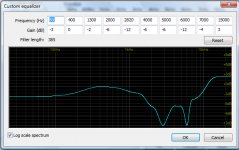
...You appear to have done serious research and chosen a competent audiologist. Do you mind sharing your choice for hearing aids?....
There's dozens of trade brands, but there are really only 7 or 6 (they keep merging) pro-level hearing aid companies. They all copy each other. Recent products are VERY good; the problem is they are too complicated to program.
Integrated testing and programming helps a lot; I just re-set my Phonak entirely by algorithms (internal audiogram, internal feedback check, DSL or NAL target) and the result is excellent (as good as three sessions at the audiologist, the last hurried by COVID). There seems to be some "flavor" difference across the several major makers, which is probably different defaults to please different types of people to get a good "first fit" and win the sale.
My audiologist suggested two brands and I liked Phonak's website a little better; the websites are NOT for geeks and I am a little tired of the same images on green layout. As of last year Phonak's ecosystem was a bit better that some: the smartphone app worked on Android and gives modest self-control. But if my audiologist felt more comfortable with another brand I would be guided by that. Despite the rise of "smart" programming software, ear-fitting is still a professional art, and is most of the cost of HAs which help instead of get left on the nightstand.
The real fans were located in front of the stage, it must had been louder there, of course.
Not necessarily. If the speakers are stacked each side of the stage blasting into the room, in front of the stage can often be an oasis of relative peace (off axis to the speakers) and the sweet listening spot.
The amount of programs and choices within them is both amazing and a bit overwhelming, Phonak does seem to have done an excellent job of making them work.Recent products are VERY good; the problem is they are too complicated to program.
Integrated testing and programming helps a lot; I just re-set my Phonak entirely by algorithms (internal audiogram, internal feedback check, DSL or NAL target) and the result is excellent (as good as three sessions at the audiologist, the last hurried by COVID).
As of last year Phonak's ecosystem was a bit better that some: the smartphone app worked on Android and gives modest self-control.
I've had three sessions at the audiologist, in the last we did some "overtuning", frequency response changes independent of the settings created when the audiogram was entered. Now after a few weeks think I may have requested a bit too much boost, would rather adjust outside the office to get a better "feel" in real world situations.
I also have the Android smartphone app, what (or how..) did you re-set your Phonak algorithms ?
Art
... ... ...I may have requested a bit too much boost, would rather adjust outside the office to get a better "feel" in real world situations.....
Yes, yes, yes. I was astonished my guy did not even have a boombox. As soon as I get in my car I know what the sound is. There's media in the Phonak clinical software but my guy had no speakers... (I am way out in the woods and all professional experience is hard to access).
Self-programming is possible but a significant commitment. Obviously neither the makers or the HA providers want to deal with the trouble and client confusion.
> if loud noise degrades hearing, why don't hearing aids that increase the volume make what's left go bad even faster?
We can hear loud sounds. Why boost them?? In fact above 80dB SPL my naked hearing is near-flat.
We can't hear soft sounds. Boost them up to medium-loud.
Here's my curves. Around 2kHz, 50dB SPL, I get 24dB of boost. At 65dB SPL boost is only 18dB. At 80dB SPL and above, only 9dB. There are also MPO (Max power output) and some variant of Maximum Comfortable Level. Much of this has been possible since the late 1970s, though not nearly as fine-grain or easy-tweak.
Attachments
Last edited:
Bleak hearing
I am 61 and just had a hearing test, awful, even at my age the audiologist said, so she sending me for an MRI scan.
I blame this on too many loud concerts in my youth, then Walkmans, and speakers with the tweeters at ear level at home. Dipoles and panels are far kinder as more dispersed but even they are causing me discomfort now....
I am 61 and just had a hearing test, awful, even at my age the audiologist said, so she sending me for an MRI scan.
I blame this on too many loud concerts in my youth, then Walkmans, and speakers with the tweeters at ear level at home. Dipoles and panels are far kinder as more dispersed but even they are causing me discomfort now....
Attachments
Question- if loud noise degrades hearing, why don't hearing aids that increase the volume make what's left go bad even faster?
Modern hearing aids split the hearing range into multiple frequency bands and apply different gains according to acoustic SPL and your hearing sensitivity.
So the applied gain is frequency and amplitude dependent. They also have acoustic shock protection, which avoids high gain.
Often the gain at low amplitude does not perfectly compensate for the hearing loss, as patients complain of too much ambient noise (as they are poorly adjusted to it after years of hearing loss)
@barbieboy, as far as I understand that is one of the hardest problems to deal with. If some of the critical frequency bands are damaged, the energy is “allocated” to undamaged adjacent bands. The perceived effect is higher spl in those bands. This can be one of the causes of hyperacusis, a painful sensitivity to loud sounds.
This “allocation” is neurological and I don’t know whether hearing aids can undo it.
This “allocation” is neurological and I don’t know whether hearing aids can undo it.
- Status
- This old topic is closed. If you want to reopen this topic, contact a moderator using the "Report Post" button.
- Home
- General Interest
- Everything Else
- Hearing High Frequencies “When I’m 64”
